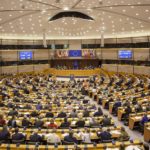 Politicians have been held in low esteem for a generation, with trust undermined by an often fundamental lack of honesty and transparency. A new study from the BBVA Foundation reminds us that this doesn’t mean faith in public institutions has wavered to the same extent however.
Politicians have been held in low esteem for a generation, with trust undermined by an often fundamental lack of honesty and transparency. A new study from the BBVA Foundation reminds us that this doesn’t mean faith in public institutions has wavered to the same extent however.
The study examined attitudes across Europe, including beliefs, preferences and values that inform our conduct and behaviors in public and private life.
The analysis revealed that our political orientation appears to be quite a broad matrix that covers a large part of our social worldview. It feeds into our perceptions, attitudes and behaviors in both the private and public sphere.
A general interest in politics
Across Europe, people expressed a low to medium amount of interest in politics, with a relatively low-key approach to following the latest news and current affairs. This contrasts however with their expectations of the state, which are very high and extend beyond ‘merely’ providing welfare services and move into areas such as control of market variables such as profits and wages.
Interestingly, a majority of respondents revealed a general level of support for austerity-related policies, with most suggesting they would prefer spending cuts rather than imbalances emerging in public accounts.
This was fundamental to trust in public institutions, which appeared to be high across the continent, with professions such as doctors, scientists, teachers and engineers also scoring highly in terms of public trust in them.
Lack of trust in politicians
This didn’t extend to politicians themselves however, as citizens perceived there to be high levels of corruption in public office, especially in Latin countries such as Spain and Italy.
Also of note is that despite proclamations about the rise of alternative media, the majority of Europeans continue to get their news, information and entertainment from conventional media, with television the most common channel used.
Despite concerns about EU over-reach by Eurosceptics, most respondents voiced happiness and price about their own nation-state, with EU membership being seen as beneficial by the majority of respondents. Interestingly, this still appeared to be the case in the UK, despite the Brexit process being in full flow.